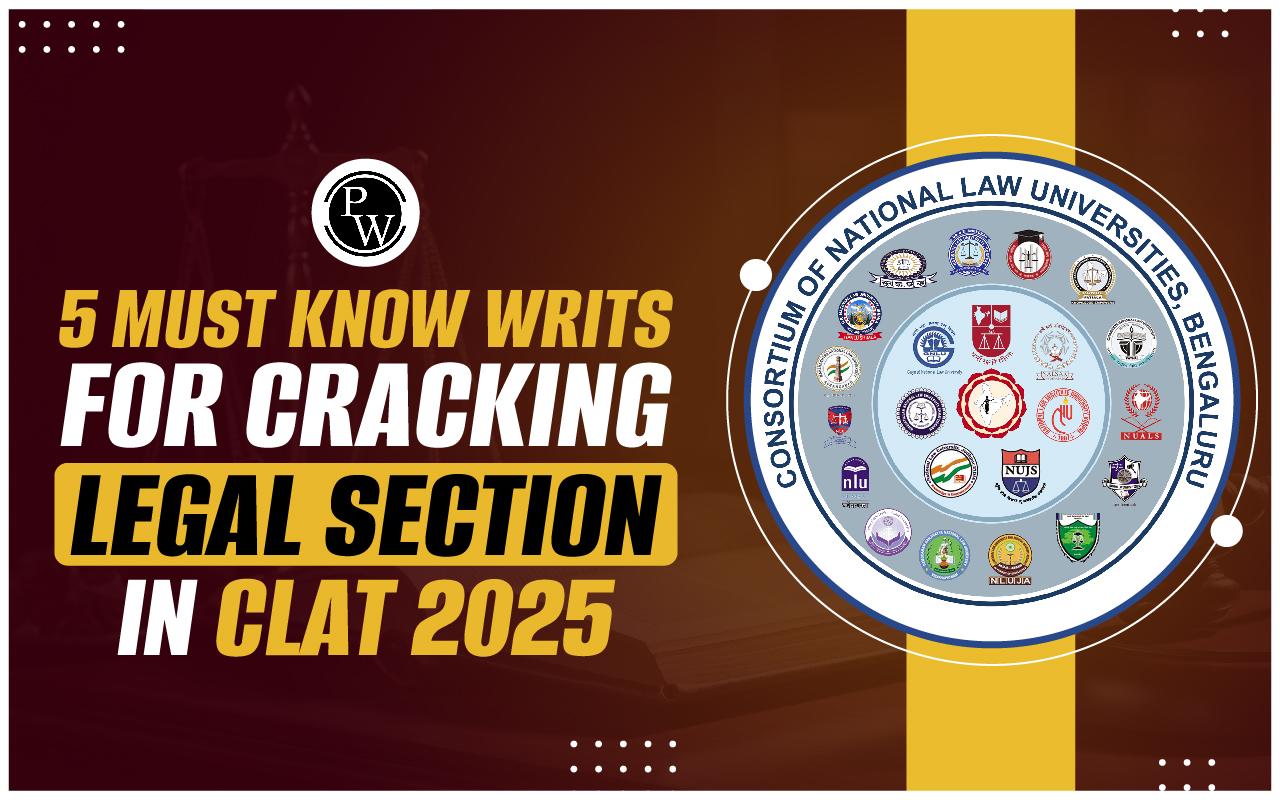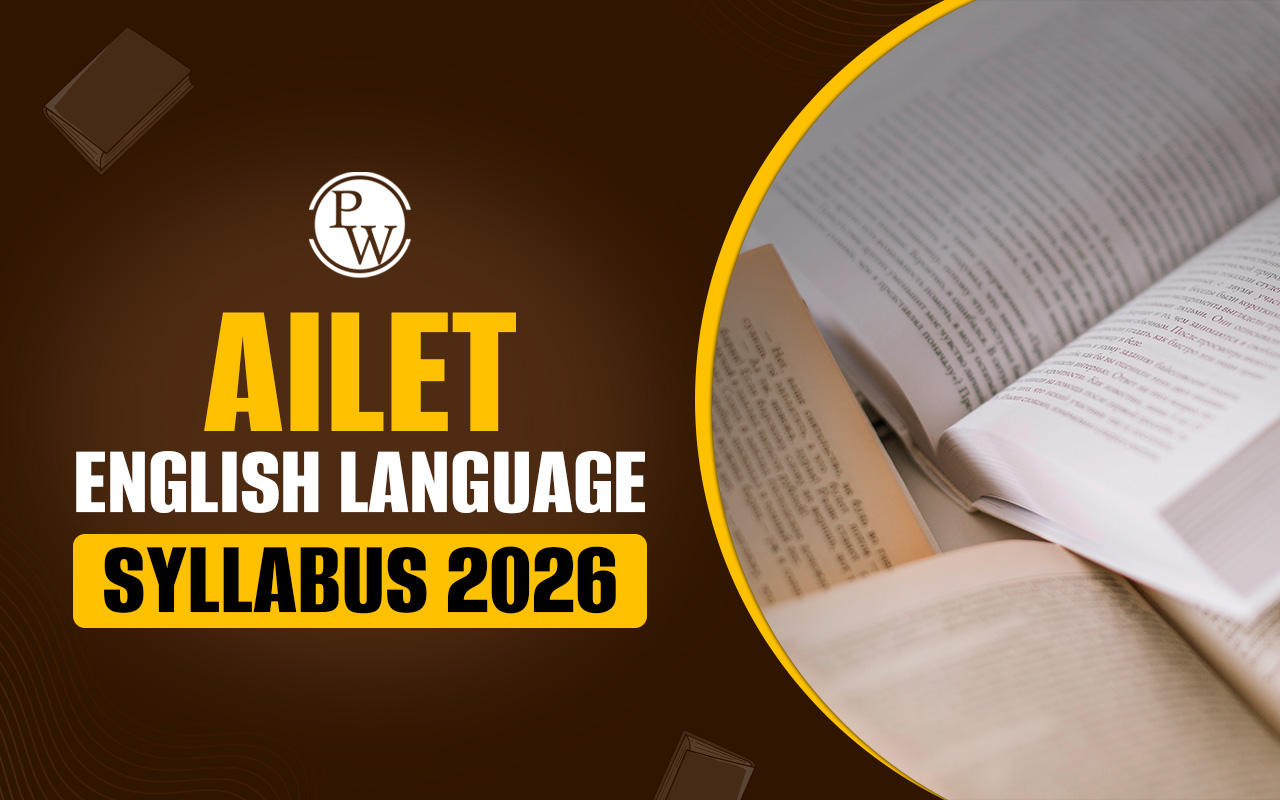
5 Must Know Writs For Cracking Legal Section in CLAT 2025: The Legal Section in CLAT 2025 tests candidates’ knowledge of the law, ability to interpret the principles, and practical application of these laws and principles. Candidates must read the fundamental rights and related cases thoroughly to score well in this section.
Under Part III of the Constitution, certain basic rights are pledged to the Indian citizens by the Constitution of India. These rights are known as “Fundamental Rights” and are very important. To ensure that justice prevails, certain powers have been given to the Supreme Court and the High Court. The distinguishing power to issue writs is also provided to them by the Constitution.Checkout Law Books from PW Store
Must Know Writs For Cracking Legal Section in CLAT 2025 - Definition
A writ is a written order or mandatory process issued by the Supreme Court or High Court commanding constitutional remedies for Indian Citizens against any violation of their fundamental rights. Under the Constitution of India, Indian citizens are provided 6 fundamental rights.- Right to equality (Articles 14-18),
- Right to freedom of religion (Articles 25 to 28),
- Cultural and educational rights (Articles 29 and 30),
- Right to constitutional remedies (Article 32),
- Right against exploitation (Articles 23 to 24),
- Right to freedom (Articles 19 to 22).
5 Types of Writs Under the Indian Constitution For Cracking Legal Section in CLAT 2025
The Supreme Court of India defers people's fundamental rights. The Indian Constitution has provided 5 types of writs as follows.- Habeas Corpus
- Mandamus
- Quo-Warranto
- Prohibition
- Certiorari
-
Habeas Corpus
- When detention is done under the rules and regulations of law.
- For proceedings related to contempt of a legislature or a court.
- When detention is done outside the jurisdiction of the court.
- Detention ordered by a competent court.
Important Article Related to Habeas Corpus
The following articles are related to the Habeas Corpus.- Article 20: It states that protection should be granted in respect of conviction for certain offenses.
- Article 21 : It states that during conviction, protection of life and personal liberty should be granted.
Example : Sheela Barse vs State of Maharashtra Case
On May 11, 1982, Sheena Barse, a journalist, filed the writ petition after interviewing 15 women prisoners in a police lockup in the city of Bombay. During the interview, she found that 2 women were assaulted in the prison. After the interview report was presented to the court, it ordered and directed Dr (Miss) A.R. Desai , Director of the College of Social Work to investigate. Finally, the charges were proven and the guilty officials were punished. Thereafter, to safeguard the women prisoners safety measures were enforced.Limitations For Habeas Corpus
Since a writ or right only provides remedies, it does not ensure protection under any other rights, such as a fair trial and more. It only guarantees any detention that is forbidden by law.-
Mandamus
- To verify the validity of an elected person in a university syndicate
- The Nomination of members to a Legislative Council by the Governor
- Mayor in the municipal corporation
- Appointments related to a Chief Justice, Chief Minister, Attorney General, University Teachers, Advocate, etc
- To implement any departmental rules or regulations if they are not under any statutory force.
- The Indian President or State Governors are exempted from this writ.
- To order someone to work, when the work is rather discretionary and not mandatory.
- For Chief Justice of a High Court working in a judicial capacity.
- To enforce a contractual obligation.
- The duty whose performance is examined for implementation must be a legal duty of a public nature.
- The performance of the duty or act must be obligatory.
Limitations For Mandamus
Mandamus Writ cannot be imposed by the Supreme Court of India on the following people.- President or State Governors
- Duties on voluntary interest
- Against any private individual
- Chief Justice of High Courts
-
Quo-Warranto
Limitations For Quo-Warranto
Quo-Warranto cannot be issued in the following cases.- Against private or ministerial offices.
- When the substantial public office of a ceaseless character created by an enactment or the Constitution is involved.
Example: Purushottam Lal vs the State of Rajasthan
In this case, a quo-warranto was filed against the Rajasthan CM elected to the house by unfair means. The court rejected the petition, expressing that it violates the constitutional provision if the CM holds office without authority. It further stated that the office of the Chief Minister is created by the Indian Constitution and is not liable to be an assembly member. Therefore questioning the validity of the Election of the Chief Minister through this writ is illegitimate and must be augmented through an election petition. To issue the Quo-Warranto Writ, the following conditions should be met.- It should be a public office created by the Constitution of India.
- The office must be substantive.
- For the appointment of the person in that office, there must not be any transgression in the Constitution of India.
-
Prohibition
-
Certiorari
- Pre-1991: The Certiorari writ can only be issued against judicial and quasi-judicial authorities, excluding all administrative authorities.
- Post-1991 : In case, the administrative authorities violate the rights of individuals, the Supreme Court has the power to issue certiorari writ.
- It cannot be issued against legislative and private individuals or bodies.
- There must be a court, tribunal, or authorized person having a legal right to act judicially.
- Such a court, bench, or officer must act or pass an order without governance or above judicial authority.
- If the order violated the principle of Natural Justice.
- If an error of judgment occurs in the order.
- If it is against the constitution or contravention to fundamental rights.
|
Other CLAT Related Links |
|
| CLAT 2025 Exam Date | CLAT Photo Size & Signature 2025 |
| Good score in CLAT 2025 | CLAT Colleges 2025 |
5 Must Know Writs For Cracking Legal Section in CLAT 2025 FAQs
How to improve the legal section in CLAT?
Is legal maxims important for CLAT?
What are the 6 types of Fundamental Rights?
What do you mean by a writ?
What can be expected about the difficulty level of CLAT 2025?













